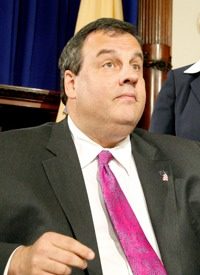
"I intend to comply with the Supreme Court's order," Christie said at a news conference. The constitutional ball is now in the Legislature's court."
The decision handed down by the Supreme Court does not mandate an increase in spending statewide, but it does require the state to meet its commitment under a 2009 agreement to equalize funding between the rich and poor school districts. Christie, who took office in January, 2010, has said the financially strapped state cannot afford to fully fund the equalization formula as it tries to balance a proposed $29.6 billion budget. Last year Christie announced an $820 million cut in education aid for the state's roughly 600 school districts. But in the decision issued yesterday, Associate Justice Jaynee LaVecchia, writing for the court's 3-2 majority, said the state may not renege on its commitment to the poorer school districts.
"Indeed, our holding in (the 2009 case) was a good-faith demonstration of deference to the political branches' authority, not an invitation to retreat from the hard-won progress that our state had made toward guaranteeing the children in Abbott districts the promise of educational opportunity," LaVecchia wrote. "Regrettably, the state did not honor its commitment."
Christie vented his anger over the ruling Tuesday at this week's "traveling town hall meeting" in Cherry Hill. "You don't elect the Supreme Court; you don't expect them to be making law," the governor told the several hundred residents in attendance. "But today, they made law. Because today, they sent an appropriations bill for $500 million that was not passed by the Legislature, that was not signed by the governor. Go to the Constitution and tell me, how the hell did they get away with that?"
Christie, a former U.S. Attorney, spoke out against the court's rulings in the school-funding lawsuit during his campaign for Governor in 2009. On Tuesday the Republican Governor argued again that spending more on the schools does not ensure better results. Citing $20,000 per pupil annual spending in the city of Camden, Christie said that regardless of spending levels, "we're seeing failure factory after failure factory," as schools continually "turn out children who cannot get a job, who often cannot read above the fourth-grade level, and you, you, are paying for that," he told the audience at his town hall meeting. "And the Supreme Court just said to you, 'How about you pay some more?' "
Assemblyman Louis D. Greenwald, a Camden Democrat, attended the town hall meeting and later took issue with Christie's statement that "the constitutional ball" is in the court of the Democratically controlled Legislature. "I played sports my whole life," he told reporters, "and real leaders want the ball when the game is on the line. They don't punt it to the other side." During the meeting, Christie reminded the audience of Greenwald's proposal to allow cities and towns to impose their own income and sales taxes in order to lower the property tax burden.
"I'm not the smartest guy in the world, but if you're trying to lower taxes, why would you make more of them?" Christie asked.
Six weeks ago, Christie said he had not ruled out open defiance of the court if it ruled in favor of the plaintiffs seeking more money for the poorer school districts. On his "Ask the Governor" radio program on April 21, Christie was asked if he would ignore such an order. "That's an option," he replied, adding it was one of "a whole range of options in the contingency plan." His decision to comply with Tuesday's court order may have been influenced by the size of the mandated expenditure. There was widespread speculation that the court might order an increase of as much as $1.7 billion spending for the schools.
Litigation over state spending on schools has been a recurring battle in New Jersey courts since at least the early 1970s, much of it centered on an 1875 amendment to the state's constitution that guarantees a "thorough and efficient system of free schools." The state Supreme Court ruled in 1973 that the heavy reliance on the local property taxes to fund education effectively denied an adequate education to students in poorer school districts. The ruling led to the passage of a state income tax three years later.
In 1985, the court, in the first of its Abbott v. Burke rulings, found that urban districts were receiving "inadequate" funding and ordered the state to provide education in those areas of an equal quality with the education programs of the wealthiest districts. In 1997, the court ordered funding for urban school districts that included money for universal pre-school and new school construction. Last June the Education Law Center filed a suit over the budget cuts in state education aid and in January the court assigned Superior Court Judge Peter Doyne the task of holding hearings to determine if funding levels met the "constitutionally mandated thorough and efficient education." Doyne reported in March that the cuts disproportionately affected at-risk students and that an additional $1.7 billion was required by the funding formula agreed to in 2009.
Chief Justice Stuart Rabner and Associate Justice Virginia Long recused themselves from the latest case, leaving five justices sharply divided in a ruling that produced four separate opinions. Justice Helen Hoens, in a dissenting opinion joining Roberto Rivera-Soto, argued that ordering the additional spending was beyond the power of the court. "Nothing in this record supports any of those essential findings," she said of the majority opinion. Hoens also joined Rivera-Soto's dissent on procedural grounds. Rivera-Soto argued that the practice of the court had been against deciding cases with fewer than four votes for the prevailing opinion.
"Although unwritten, that practice is borne out by the relevant political data," he said. LaVecchia was unmoved by the arguments.
"The dissenters' transparent attempt at nullification of a decision with which they disagree fails on every factual and legal basis," she wrote.
Photo of Chris Christie: AP Images



